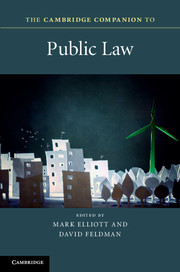Book contents
- Frontmatter
- Contents
- Notes on Contributors
- Introduction
- 1 The distinctiveness of public law
- 2 The politics of public law
- 3 The rule of law in public law
- 4 Legislative supremacy in a multidimensional constitution
- 5 The politics of accountability
- 6 Rights and democracy in UK public law
- 7 Public law values in the common law
- 8 Public law and public laws
- 9 Public law and privatisation
- 10 State architecture: subsidiarity, devolution, federalism and independence
- 11 Soft law never dies
- 12 The impact of public law litigation
- 13 Designing and operating constitutions in global context
- Index
- References
12 - The impact of public law litigation
Published online by Cambridge University Press: 05 September 2015
- Frontmatter
- Contents
- Notes on Contributors
- Introduction
- 1 The distinctiveness of public law
- 2 The politics of public law
- 3 The rule of law in public law
- 4 Legislative supremacy in a multidimensional constitution
- 5 The politics of accountability
- 6 Rights and democracy in UK public law
- 7 Public law values in the common law
- 8 Public law and public laws
- 9 Public law and privatisation
- 10 State architecture: subsidiarity, devolution, federalism and independence
- 11 Soft law never dies
- 12 The impact of public law litigation
- 13 Designing and operating constitutions in global context
- Index
- References
Summary
It is widely said that judicial review is a principal means for giving practical effect to the rule of law in the United Kingdom. In order to understand judicial review's contribution to the rule of law, however, we need to know something about the practical effects of judicial review itself. How do public authorities respond to legal challenges and react to judicial review more generally? What do those who bring judicial review proceedings achieve by doing so? This chapter considers the current state of knowledge on these matters and reflects on what this reveals about judicial review's contribution to the practical application of the rule of law in the UK.
The chapter is not directly concerned with the broader impacts of judicial review on social or policy change, or with exploring executive or parliamentary reactions to judicial review, important and interesting as these matters are. Nonetheless, it is worth noting that the growth in the importance of judicial review is a notable feature of the recent history of public law. It has been said to amount ‘to a major change in Britain's constitutional structure, a major rebalancing of its constitution’; and to have caused ‘war’ between government and the judges. Such tensions have also fuelled significant debate amongst academic commentators, in particular between the legal constitutionalists who broadly applaud the growing importance of judicial review and the political constitutionalists who fear a dangerous shift of power to the courts and away from systems of political accountability rooted in Parliament.
Seen from the perspective of judicial review's ability to control government, the change is famously reflected by two contrasting statements in earlier editions of what is now De Smith's Judicial Review. Until the fourth edition (published in 1980), judicial review was said to provide:
just one of a number of legal controls of administrative action and its role is inevitably sporadic and peripheral.
In the fifth edition (published in 1995) a rather different observation was added:
[T]he effect of judicial review on the practical exercise of power has now become constant and central.
- Type
- Chapter
- Information
- The Cambridge Companion to Public Law , pp. 236 - 255Publisher: Cambridge University PressPrint publication year: 2015
References
- 2
- Cited by



